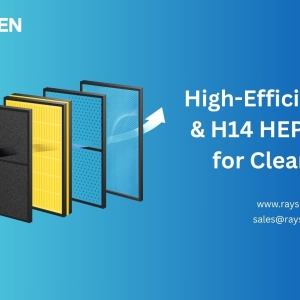Air quality is a critical factor in industrial and medical environments. From manufacturing cleanrooms to hospital operating theaters, maintaining contaminant-free air is essential for ensuring product quality, patient safety, and regulatory compliance. Among the most reliable solutions for high-efficiency air filtration is the H13 HEPA filter. At Rayshen, our H13 filters are designed to deliver exceptional performance, removing microscopic airborne particles and maintaining clean, safe environments across diverse applications.
What Are H13 HEPA Filters?
H13 filters belong to the High-Efficiency Particulate Air (HEPA) family, offering a high standard of filtration suitable for critical environments. According to international HEPA standards, an H13 filter captures 99.95% of airborne particles as small as 0.3 microns. This capability makes them ideal for environments where even minimal contamination can result in costly errors, compromised products, or health hazards.
Unlike standard filters, H13 HEPA filters combine dense, pleated media with advanced filtration technology to trap dust, allergens, bacteria, and other microscopic contaminants effectively.
How H13 Filters Work
The operation of an H13 filter is straightforward but highly effective. Air flows through a tightly packed pleated filter media, and particles are captured via several mechanisms:
- Interception: Particles following airflow lines adhere to filter fibers.
- Impaction: Larger particles collide with fibers and become trapped.
- Diffusion: Extremely small particles collide with air molecules and diffuse onto filter fibers.
This multi-layered filtration ensures that the air leaving the H13 filter is practically free of contaminants, creating an ultra-clean environment for sensitive processes and operations.
Key Benefits of H13 Filters
1. Exceptional Air Purity
The primary advantage of H13 HEPA filters is their ability to remove virtually all particulate contaminants. This is essential in industrial and medical settings where even tiny particles can compromise equipment, processes, or patient safety.
2. Protection for Sensitive Environments
In pharmaceutical labs, biotechnology facilities, and hospitals, sensitive equipment and processes require clean, contaminant-free air. Installing H13 filters ensures protection for both personnel and critical operations.
3. Compliance with Regulatory Standards
Industries like healthcare and pharmaceuticals are subject to strict ISO, GMP, and FDA standards. H13 filters help facilities maintain compliance by consistently delivering clean air that meets these rigorous requirements.
4. Cost-Effective and Durable
Although high-performance, H13 filters are designed for long-term use. Their robust construction and high particle-holding capacity reduce the frequency of replacements, minimizing downtime and maintenance costs.
Industrial Applications of H13 Filters
H13 HEPA filters are widely used across industrial sectors to maintain clean, contaminant-free environments:
- Semiconductor Manufacturing: Protecting microchips and electronic components from dust and microscopic particles that could cause defects.
- Pharmaceutical Production: Ensuring sterile conditions for drug manufacturing and compounding.
- Food and Beverage Industry: Maintaining hygiene and reducing airborne contaminants in production and packaging areas.
- Laboratories: Providing a controlled environment for chemical, biological, and research applications.
By integrating Rayshen H13 filters into HVAC systems, Fan Filter Units (FFUs), or other cleanroom setups, industries can achieve precise airflow control and optimal air cleanliness.
Medical Applications of H13 Filters
In healthcare, H13 HEPA filters are critical for patient safety and infection control:
- Operating Rooms: Preventing airborne contamination during surgeries to reduce the risk of infection.
- Isolation Wards: Maintaining a sterile environment for patients with contagious diseases.
- Pharmaceutical Compounding Labs: Ensuring that sterile medications and intravenous products are free from contamination.
- Critical Care Units: Protecting immunocompromised patients from harmful airborne particles.
Using H13 filters in medical HVAC systems or cleanroom setups ensures that the air is consistently free from pathogens, allergens, and other contaminants.
Choosing the Right H13 Filter
When selecting an H13 filter, consider several factors:
- Airflow Requirements: Ensure the filter supports the air changes per hour (ACH) required for your facility.
- Compatibility: Filters must fit existing HVAC or FFU systems without compromising performance.
- Maintenance: Look for filters with a durable design that allows easy replacement and maintenance.
- Application Needs: Choose filters based on particle size, cleanroom classification, and environmental requirements.
Rayshen’s H13 filters are designed to meet all these requirements, offering high efficiency, easy integration, and reliable performance for both industrial and medical settings.
Conclusion
Air quality is essential for the success of both industrial processes and medical operations. H13 HEPA filters provide a high level of air purification, protecting sensitive equipment, ensuring patient safety, and maintaining compliance with strict industry standards.
Whether it’s semiconductor fabrication, pharmaceutical production, or hospital operations, H13 filters from Rayshen deliver consistent performance and reliability. By investing in high-quality H13 filtration, organizations can safeguard their operations, protect personnel, and achieve the clean, contaminant-free environments necessary for modern industrial and medical settings.








